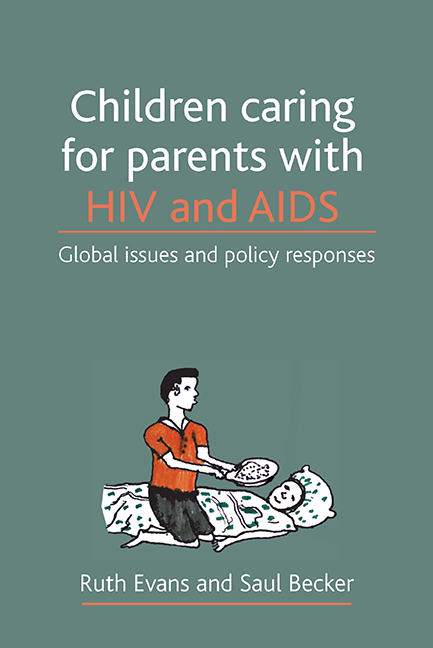Book contents
- Frontmatter
- Dedication
- Contents
- List of tables, figures and boxes
- Preface
- one Children’s and young people’s caring responsibilities within the family
- two HIV and the family
- three Reflexivity, methodology and ethics: the research process
- four Living with HIV and the effects on family life: parents’ narratives
- five Children’s and young people’s care work in households affected by HIV and AIDS
- six Resilience and impacts of care work for individual young people and their families
- seven Resilience and impacts of young people’s care work within the school and wider community
- eight The role of formal safety nets in building children’s and families’ resilience
- nine Global and local processes influencing young people’s caring roles in families affected by HIV and AIDS
- ten Responding to the support needs of children and young people caring for parents with HIV
- Bibliography
- Index
two - HIV and the family
Published online by Cambridge University Press: 21 January 2022
- Frontmatter
- Dedication
- Contents
- List of tables, figures and boxes
- Preface
- one Children’s and young people’s caring responsibilities within the family
- two HIV and the family
- three Reflexivity, methodology and ethics: the research process
- four Living with HIV and the effects on family life: parents’ narratives
- five Children’s and young people’s care work in households affected by HIV and AIDS
- six Resilience and impacts of care work for individual young people and their families
- seven Resilience and impacts of young people’s care work within the school and wider community
- eight The role of formal safety nets in building children’s and families’ resilience
- nine Global and local processes influencing young people’s caring roles in families affected by HIV and AIDS
- ten Responding to the support needs of children and young people caring for parents with HIV
- Bibliography
- Index
Summary
The global HIV/AIDS epidemic
Since the first cases emerged in the early 1980s, HIV (human immunodeficiency virus) and AIDS (acquired immunodeficiency syndrome) have been recognised not only as a health issue, but as a social issue that can have profound effects on people's sense of self, emotional well-being, relationships with partners, family members and friends and their requirements for care and support. During the early years of the epidemic in the US, Western Europe and other high-income countries, HIV was associated with particular ‘risk groups’, notably gay men and intravenous drug users (Bor et al, 1993). Since the late 1990s, however, there has been a rapid increase in the number of new HIV diagnoses associated with heterosexual transmission in Western Europe, including in the UK, but a relatively stable number of new HIV infections each year in North America (UNAIDS/WHO, 2007). An estimated 2.1 million people were living with HIV in North America, Western and Central Europe in 2007 (UNAIDS/WHO, 2007).
Enormous gains have been made in the life expectancy of people living with HIV, since the introduction of highly active antiretroviral therapy (HAART) in high-income countries in the 1990s, resulting in a comparatively low number of AIDS-related deaths in these countries (UNAIDS/WHO, 2007). In the UK and other countries in Western Europe, African migrant populations are disproportionately affected by HIV (UK Collaborative Group for HIV and STI Surveillance, 2006). Medical advances, migration and increases in heterosexual transmission have to some extent changed the dynamics of the epidemic in countries such as the UK, with a growing number of children and young people affected by parental HIV. Despite medical advances, however, HIV and AIDS remain highly stigmatised conditions that reinforce inequalities based on race, gender, sexuality and class in many countries in the global North. HIV has been shown to lead to and exacerbate poverty, social exclusion and marginalisation, affecting children's and parents’ access to and experiences of family or community support, health and social care, education, employment, housing, and immigration processes. While HIV affects individuals from different cultures in different ways, Miller and Murray (1999: 285) suggest that, based on their experiences as HIV counsellors in London, there are many similarities in the ways that HIV affects parents and children that ‘transcend race, religion, culture and migration’.
- Type
- Chapter
- Information
- Children Caring for Parents with HIV and AIDSGlobal Issues and Policy Responses, pp. 39 - 66Publisher: Bristol University PressPrint publication year: 2009



